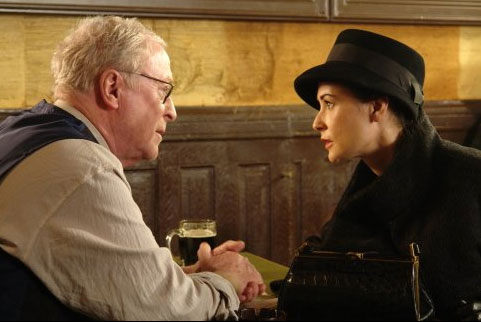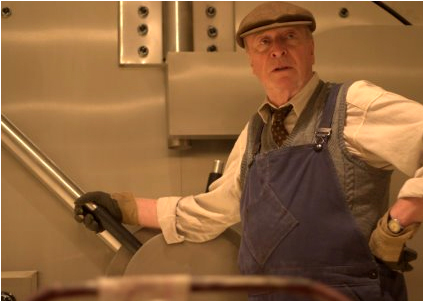

We love heist movies, or so it seems. Perhaps it's because it caters to our greed, as we put ourselves in the shoes of the protagonist, and then dream of what we would do with the millions if we got away with it. Perhaps it's the sense of adventure, of risk by breaking the rules. One of my friends said she wished she were a bank robber. Why? Because if she could get away with it, she would know she were smart enough to do anything with her life. Twisted logic maybe. But it highlights the attraction of the darker-side.
Flawless is a heist movie. But it's not a bank that is being robbed, it's a diamond house. And not any diamond house, but the biggest in London, where the world's diamonds are cleared. With a vault of millions of cut and uncut diamonds, it is the Fort Knox of pressurized carbon.
 The movie opens with scenes of women workers of all varieties, going to work in London. When a wrinkled gray woman meets a journalist in a cafe and starts to weave a tale, it becomes clear that the story is really set in the swinging 60s. It could not work in any other decade, since the focus is on the tale-teller, Laura Quinn (Demi Moore), the only woman manager in the London Diamond Company. In earlier decades women did not work as managers. In later decades, women's liberation movements had earned a level of equality, resulting in a plethora of female managers.
The movie opens with scenes of women workers of all varieties, going to work in London. When a wrinkled gray woman meets a journalist in a cafe and starts to weave a tale, it becomes clear that the story is really set in the swinging 60s. It could not work in any other decade, since the focus is on the tale-teller, Laura Quinn (Demi Moore), the only woman manager in the London Diamond Company. In earlier decades women did not work as managers. In later decades, women's liberation movements had earned a level of equality, resulting in a plethora of female managers.
Quinn is not only a female in a male-dominated world, she is smarter than most, being an Oxford-educated American. But chauvinism is nothing if not protective, and she is passed over time and again, as her less informed male peers becomes her seniors and even board members. This rubs salt in her feminine wounds. When she learns from Mr. Hobbs (Michael Caine), the blue-collar night-working janitor, that she is going to be fired, that is simply the last straw.
 Hobbs offers her a chance to get even with the company -- together they would rob the vault. But they would steal only a handful of diamonds, a trifling amount providing perhaps a million each, since that is small enough potatoes that the company would not even notice. Even a million is a nice termination ticket. In today's money that would be 100 million or more. To entice her, he asks her what she would do with her share. Greed does sell.
Hobbs offers her a chance to get even with the company -- together they would rob the vault. But they would steal only a handful of diamonds, a trifling amount providing perhaps a million each, since that is small enough potatoes that the company would not even notice. Even a million is a nice termination ticket. In today's money that would be 100 million or more. To entice her, he asks her what she would do with her share. Greed does sell.
The plot is simple and clear. This is no who-dunnit. Rather, it is a how-dunnit. As the plot advances, we wonder with Quinn how Hobbs plans to execute the theft and escape undetected. When video cameras are installed at the last minute, it brings an added dimension of complexity and tension. Then when Hobbs double-crosses Quinn and takes the theft in a totally different direction, this how-dunnit becomes simultaneously a why-dunnit.
 Throughout, Flawless keeps the viewer intrigued with these two questions of how and why. We know why Quinn want the money -- greed. But Hobbs is a different fish. He is an unknown character, and it is only at the climax that we understand the motive for his manipulations.
Throughout, Flawless keeps the viewer intrigued with these two questions of how and why. We know why Quinn want the money -- greed. But Hobbs is a different fish. He is an unknown character, and it is only at the climax that we understand the motive for his manipulations.
Flawless is flawless in its plot development and only close to the end is it possible to figure out the sheme. But it is flawed in its execution by one-dimensional characters, with no serious arc, and shoddy acting. Moore is stiff as Quinn. For a so-smart manager, she seems foolish to fall into bed with his plan and even more stupid to be seen publicly whispering with him. She appears nervous throughout, and is clearly guilty as sin. A poor partner for Hobbs to choose, even if she is the only one available. Yet it would seem she would realize that she has to act more innocent to escape the level of suspicion that would fall upon her. Caine, on the other hand gives a workman-like performance as a working-man. Like many other lauded and knighted actors, he does not always bring his A-game to the movies he now stars in. Still, it is an interesting movie, if not a crown jewel.
Toward the end of the movie, Hobbs says to Quinn, "Life is for living. It's there for the taking. Grant yourself no regrets." Certainly, this is an ethic that would resonate with most people. And it is not unbiblical. Jesus came to offer life, an over-abundant life (John 10:10). We need to grab hold of life with two hands as we would a raging bull or the sides of raft amidst the white waters of the Deschutes River. But we grant ourselves no regrets only if we have given full repentance and received full forgiveness for what would cause such regret.
Earlier, when he is trying to entice Quinn to join him, he asks her the question, "Will you be a giver or a taker?" In other words, how will she use the money? Despite being a scoffer at biblical faith (obvious from one of his passing comments), he has put his finger on the ethical use of money. Money itself is amoral, neither moral or immoral. But our use of it shows our internal character and passes judgment on us. When we have money, excess or not, what do we do with it? Do we look to give it away, to help others? Are we like the widow who Jesus saw give her only two coins away secretly (Lk.21:2-4)? Or are we like the rich man who wanted to hoard it for himself, taking all that he can (Lk. 12:16-20)? Are you a giver or a taker? Either way, God will be your judge.
Copyright © 2008, Martin Baggs

No comments:
Post a Comment